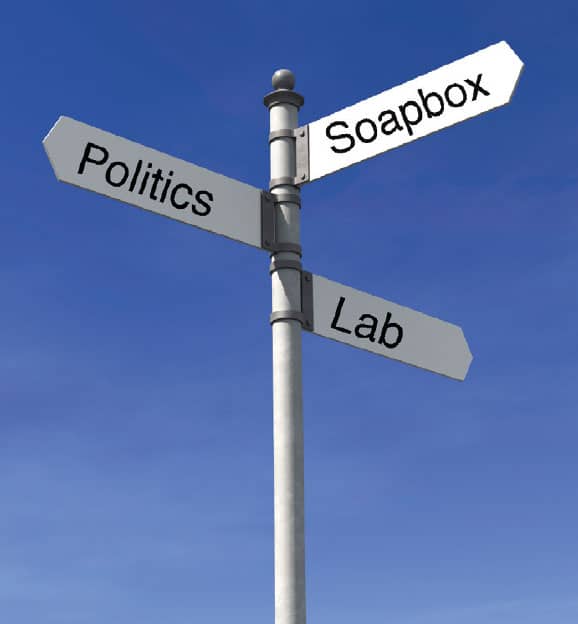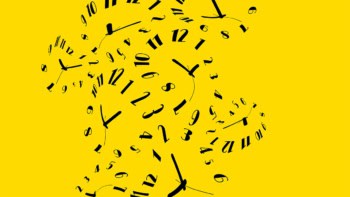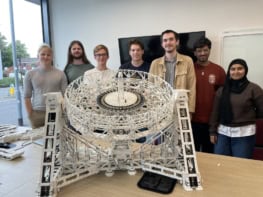Robert P Crease finds insights into how to promote the values of science from an unlikely source

I recently read a book with remarkable insights about what it is to be a scientist, the plight of science in the modern world and the challenge of maintaining its values. Before I tell you the name of the book – no peeking, or it will destroy the effect! – let me summarize the argument, specifying key passages.
Scientists, the book observes, tend to be attracted not only by the joy of practising science, but also by the beauty and wonder of nature (p3). Many know that science plays an indispensable part in solving pressing social problems, and are eager to help.
Yet, strangely, the cultural position of science is beleaguered. On the one hand, viewed from the local perspective of universities and labs, research exhibits an “extraordinary and genuine vitality” (p91). On the other hand, science does not have the cultural influence that it should; from a global and social perspective, science is not only marginalized but a “weak culture”. Despite the vitality of science, “the whole (in terms of its influence in the larger political economy of cultural production) is significantly less than the sum of its parts” (p92). Furthermore, though science is vital to our personal, economic and political wellbeing, it “has become highly politicized” (p109).
Three coping strategies
Scientists tend to cope by adopting one of three postures, which might be called the progressive, “neo-Anabaptist” and conservative attitudes (p109). Progressives actively seek to use science for social agendas, running the risk of compromising its ideals and distorting its otherwise rigorous standards and practice. Neo-Anabaptists hold an opposing view. They find politics corrupting to science and keep their distance from it. They maintain that science belongs in the laboratory, and distrust attempts to use it for political ends. Conservatives – the vast majority – blame the schools, media and politicians for encouraging irrationalism and pseudoscience, and for spreading “misinformation and fear” (p117), which is causing great harm to humanity and to the planet. Scientists, the conservatives claim, “have been under-represented, ridiculed and outright ignored by our political leaders for much too long” (p117), and that it is time to reassert reason in cultural discourse.
But none of these three approaches has managed to improve the cultural status of science. The principal reason is a failure to understand culture. Most scientists – understandably, for they are untrained in social theory – have a deeply flawed working theory of culture and how it changes (p24). This theory, a form of idealism, assumes that culture is ultimately a matter of ideas: to change culture you change ideas, and therefore “the autonomous and rational individual is the key actor in social change” (p26). Scientists, for instance, tend to assume they can change deeply ingrained ideas about science simply by speaking up loudly and articulately enough. But this is naive, ignores how culture “is generated, coordinated and organized”, and “mistakenly imputes a logic and rationality to culture where such linearity and reasonableness does not exist but rather contingency and accident” (p26).
To make science seem not just a set of true facts, but symbolically and culturally vital, requires creating and developing new means of exhibiting the value of scientific research in its own right, and of showing its value for addressing social problems. “The only way to change culture is to create more of it,” according to the author (p28).
This is not as formidable as it sounds; science has plenty of resources. First, nearly everyone is implicitly and informally a scientist because they possess certain scientific qualities (let’s say knowing how to inquire, test and discover) even if only “in fragments or in corrupted form” (p232). Nearly everyone therefore has a proto-scientific attitude that can be fostered. This fostering should not have as its goal changing people into scientists, but rather encouraging their appreciation of its value in understanding and coping with the world (p242). Another means to improve science’s cultural role would be to build institutions that give “tangible expression” (p78) to scientific culture alongside the existing social environment.
Science is fated to have a dual destiny. It is a rigorous discipline with its own norms and vitality independent of the general culture – but it is also historically and practically important to that general culture. Thus the book counsels a practice of “scientific presence” in which scientists engage the world by exhibiting “the exercise of leadership in all spheres and all levels of life and activity” oriented to “the flourishing of the world around us” (p260–261).
The critical point
How accurate and insightful did you find this characterization? I find it spot on. But let me now confess that my description was not entirely above board. It was instead a thought-experiment because the book I have been quoting from is To Change the World: The Irony, Tragedy, and Possibility of Christianity in the Late Modern World by James Hunter, Distinguished Professor of Religion, Culture and Social Theory at the University of Virginia. I was alerted to the book by a newspaper editorial. While my summary of its key portions was on the whole accurate, I have changed a handful of words, substituting “scientists” for “Christians”, “scientific” for “Christian” and “science/ research” for “Christianity”, “the church”, “faith” and so forth.
Conservatives can imagine this book as a sophisticated strategy manual that has been captured from an enemy combatant: while the goals radically differ from your own, it is a must-read for strategy tips. To keep science robust and healthy, it is not enough to conduct scientific research; we also have to promote those values that allow research to be effectively and wisely conducted, and seen as relevant to current social problems. Yet because of our flawed theory of culture, the way scientists promote such values has been haphazard, incompetent and often even counter-productive. If we have not studied culture seriously, a first step is to learn from those who have.



